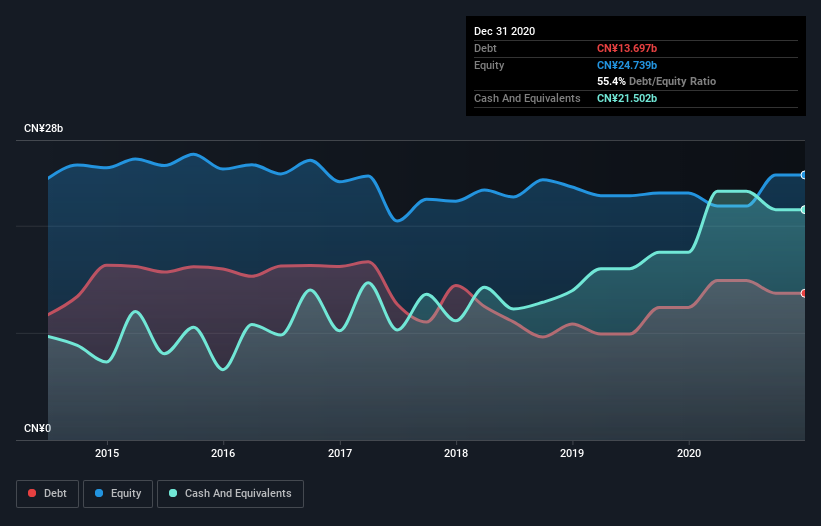These 4 Measures Indicate That Tingyi (Cayman Islands) Holding (HKG:322) Is Using Debt Safely

Some say volatility, rather than debt, is the best way to think about risk as an investor, but Warren Buffett famously said that 'Volatility is far from synonymous with risk.' When we think about how risky a company is, we always like to look at its use of debt, since debt overload can lead to ruin. We note that Tingyi (Cayman Islands) Holding Corp. (HKG:322) does have debt on its balance sheet. But the real question is whether this debt is making the company risky.
When Is Debt Dangerous?
Debt assists a business until the business has trouble paying it off, either with new capital or with free cash flow. If things get really bad, the lenders can take control of the business. However, a more common (but still painful) scenario is that it has to raise new equity capital at a low price, thus permanently diluting shareholders. By replacing dilution, though, debt can be an extremely good tool for businesses that need capital to invest in growth at high rates of return. When we think about a company's use of debt, we first look at cash and debt together.
View our latest analysis for Tingyi (Cayman Islands) Holding
How Much Debt Does Tingyi (Cayman Islands) Holding Carry?
You can click the graphic below for the historical numbers, but it shows that as of December 2020 Tingyi (Cayman Islands) Holding had CN¥13.7b of debt, an increase on CN¥12.4b, over one year. However, it does have CN¥21.5b in cash offsetting this, leading to net cash of CN¥7.81b.

How Strong Is Tingyi (Cayman Islands) Holding's Balance Sheet?
According to the last reported balance sheet, Tingyi (Cayman Islands) Holding had liabilities of CN¥27.1b due within 12 months, and liabilities of CN¥9.72b due beyond 12 months. Offsetting these obligations, it had cash of CN¥21.5b as well as receivables valued at CN¥2.56b due within 12 months. So its liabilities outweigh the sum of its cash and (near-term) receivables by CN¥12.7b.
Since publicly traded Tingyi (Cayman Islands) Holding shares are worth a very impressive total of CN¥65.8b, it seems unlikely that this level of liabilities would be a major threat. However, we do think it is worth keeping an eye on its balance sheet strength, as it may change over time. While it does have liabilities worth noting, Tingyi (Cayman Islands) Holding also has more cash than debt, so we're pretty confident it can manage its debt safely.
In addition to that, we're happy to report that Tingyi (Cayman Islands) Holding has boosted its EBIT by 52%, thus reducing the spectre of future debt repayments. When analysing debt levels, the balance sheet is the obvious place to start. But ultimately the future profitability of the business will decide if Tingyi (Cayman Islands) Holding can strengthen its balance sheet over time. So if you want to see what the professionals think, you might find this free report on analyst profit forecasts to be interesting.
But our final consideration is also important, because a company cannot pay debt with paper profits; it needs cold hard cash. While Tingyi (Cayman Islands) Holding has net cash on its balance sheet, it's still worth taking a look at its ability to convert earnings before interest and tax (EBIT) to free cash flow, to help us understand how quickly it is building (or eroding) that cash balance. Over the last three years, Tingyi (Cayman Islands) Holding actually produced more free cash flow than EBIT. That sort of strong cash generation warms our hearts like a puppy in a bumblebee suit.
Summing up
Although Tingyi (Cayman Islands) Holding's balance sheet isn't particularly strong, due to the total liabilities, it is clearly positive to see that it has net cash of CN¥7.81b. And it impressed us with free cash flow of CN¥6.4b, being 138% of its EBIT. So we don't think Tingyi (Cayman Islands) Holding's use of debt is risky. When analysing debt levels, the balance sheet is the obvious place to start. However, not all investment risk resides within the balance sheet - far from it. For instance, we've identified 2 warning signs for Tingyi (Cayman Islands) Holding that you should be aware of.
When all is said and done, sometimes its easier to focus on companies that don't even need debt. Readers can access a list of growth stocks with zero net debt 100% free, right now.
When trading stocks or any other investment, use the platform considered by many to be the Professional's Gateway to the Worlds Market, Interactive Brokers. You get the lowest-cost* trading on stocks, options, futures, forex, bonds and funds worldwide from a single integrated account. Promoted
Valuation is complex, but we're here to simplify it.
Discover if Tingyi (Cayman Islands) Holding might be undervalued or overvalued with our detailed analysis, featuring fair value estimates, potential risks, dividends, insider trades, and its financial condition.
Access Free AnalysisThis article by Simply Wall St is general in nature. It does not constitute a recommendation to buy or sell any stock, and does not take account of your objectives, or your financial situation. We aim to bring you long-term focused analysis driven by fundamental data. Note that our analysis may not factor in the latest price-sensitive company announcements or qualitative material. Simply Wall St has no position in any stocks mentioned.
*Interactive Brokers Rated Lowest Cost Broker by StockBrokers.com Annual Online Review 2020
Have feedback on this article? Concerned about the content? Get in touch with us directly. Alternatively, email editorial-team (at) simplywallst.com.
About SEHK:322
Tingyi (Cayman Islands) Holding
An investment holding company, manufactures and sells instant noodles, beverages, and instant food products in the People’s Republic of China.
Solid track record with adequate balance sheet.


